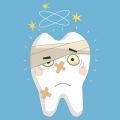Pediatric Teeth Grinding Treatment
 Pediatric Dentistry: Dr. Sara B. Babich, DDS
Pediatric Dentistry: Dr. Sara B. Babich, DDS
Teeth grinding during sleep, termed nocturnal bruxism, is surprisingly very common in children. For example, Insana et al. (2013, Community based study of sleep bruxism during early childhood, Sleep Med., 14:183-188), in their study of children in Jefferson County, Kentucky, noted 36.8% of 1,953 preschoolers and 49.6% of 2,888 first grade children reported nocturnal teeth grinding one or more times per week.
Nocturnal teeth grinding in children may commence with the emergence of baby teeth and then later at the emergence of permanent teeth. Most children spontaneously stop nocturnal teeth grinding when their baby and permanent teeth have fully emerged, with nocturnal bruxism seldom occurring by the age of thirteen. Bouts of nocturnal bruxism last for about 4 seconds and occur about six times an hour, and may be accompanied by an awakening from sleep.
Most children eventually outgrow bruxism and dental treatment is not recommended unless there are immediate health issues. For example, intense teeth grinding of the upper jaw against the lower jaw may trigger dental concerns, such as:
- Excessive wear on the teeth
- Chipped teeth
- Facial and jaw pain
- Tooth temperature sensitivity to hot and cold foods
- Headache or ear pain
Nocturnal bruxism is a multifactorial habit, combining psychological, lifestyle, and hereditary factors.
Bruxism in children has been associated with:
- Stress
- Anxiety
- Hyperactivity (e.g., being strongly associated with Attention Deficit Hyperactivity Disorder (ADHD))
- Nightmares
- Snoring
Lifestyle stressors for children may include maternal depression, family bereavement, and relocating to a different neighborhood.
Prolonged breast-feeding and bottle-feeding and the habit of biting on objects was associated with nocturnal bruxism in preschool children.
Heredity may play a role and bruxism can be said to “run-in-families.” Thus, bruxism is more likely to occur in children whose parents exhibited bruxism than in children whose parents were bruxism-free.
Read more: https://www.nycpediatricdentist.com/pediatric-teeth-grinding/
Pediatric Dentistry: Dr. Sara B. Babich, DDS
116 E 84th St,
New York, NY 10028
(212) 988-4070
Web Address: https://www.nycpediatricdentist.com/
Google maps: https://g.page/dr-sara-babich-pediatric-dds-nyc
https://plus.codes/87G8Q2HV+83 New York
Nearby Locations:
Lenox Hill | Manhattan Valley | Carnegie Hill | Yorkville Manhattan | Upper West Side
10029 | 10028 | 10021| 10044, 10065, 10075, 10128 | 10022
Working Hours:
Monday: 9AM-6PM
Tuesday: 9AM-6PM
Wednesday: 9AM-6PM
Thursday: 9AM-6PM
Friday: 9AM-4PM
Saturday: Closed
Sunday: Closed
Payment: cash, check, credit cards.
Other products and services:
- +1 (212) 988-4070
- 116 East 84th Street, New York, New York, 10028
- www.nycpediatricdentist.com/




